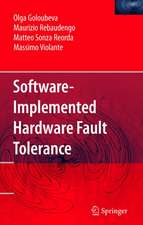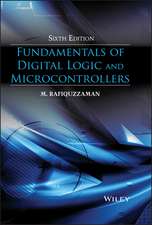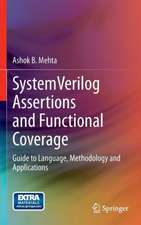System-level Test and Validation of Hardware/Software Systems: Springer Series in Advanced Microelectronics, cartea 17
Editat de Matteo Sonza Reorda, Zebo Peng, Massimo Violanteen Limba Engleză Hardback – 3 mai 2005
SOC is also reshaping approaches to test and validation activities. These are beginning to migrate from the traditional register-transfer or gate levels of abstraction to the system level. Until now, test and validation have not been supported by system-level design tools so designers have lacked the infrastructure to exploit all the benefits stemming from the adoption of the system level of abstraction. Research efforts are already addressing this issue.
This monograph provides a state-of-the-art overview of the current validation and test techniques by covering all aspects of the subject including:
- modeling of bugs and defects;
- stimulus generation for validation and test purposes (including timing errors;
- design for testability.
| Toate formatele și edițiile | Preț | Express |
|---|---|---|
| Paperback (1) | 635.31 lei 43-57 zile | |
| SPRINGER LONDON – 10 noi 2010 | 635.31 lei 43-57 zile | |
| Hardback (1) | 639.84 lei 43-57 zile | |
| SPRINGER LONDON – 3 mai 2005 | 639.84 lei 43-57 zile |
Din seria Springer Series in Advanced Microelectronics
- 15%
 Preț: 645.79 lei
Preț: 645.79 lei - 18%
 Preț: 951.59 lei
Preț: 951.59 lei - 20%
 Preț: 645.31 lei
Preț: 645.31 lei - 15%
 Preț: 643.34 lei
Preț: 643.34 lei - 18%
 Preț: 1007.35 lei
Preț: 1007.35 lei - 18%
 Preț: 1229.38 lei
Preț: 1229.38 lei - 15%
 Preț: 641.03 lei
Preț: 641.03 lei - 18%
 Preț: 954.45 lei
Preț: 954.45 lei - 15%
 Preț: 641.20 lei
Preț: 641.20 lei - 18%
 Preț: 1842.94 lei
Preț: 1842.94 lei - 18%
 Preț: 1051.98 lei
Preț: 1051.98 lei - 18%
 Preț: 955.70 lei
Preț: 955.70 lei - 18%
 Preț: 953.82 lei
Preț: 953.82 lei - 15%
 Preț: 638.24 lei
Preț: 638.24 lei - 18%
 Preț: 1110.55 lei
Preț: 1110.55 lei -
 Preț: 387.20 lei
Preț: 387.20 lei - 15%
 Preț: 642.68 lei
Preț: 642.68 lei - 18%
 Preț: 956.81 lei
Preț: 956.81 lei - 15%
 Preț: 642.03 lei
Preț: 642.03 lei - 18%
 Preț: 947.35 lei
Preț: 947.35 lei - 18%
 Preț: 955.88 lei
Preț: 955.88 lei - 15%
 Preț: 632.70 lei
Preț: 632.70 lei - 18%
 Preț: 936.95 lei
Preț: 936.95 lei - 18%
 Preț: 946.87 lei
Preț: 946.87 lei - 18%
 Preț: 1559.80 lei
Preț: 1559.80 lei - 15%
 Preț: 633.53 lei
Preț: 633.53 lei
Preț: 639.84 lei
Preț vechi: 752.75 lei
-15% Nou
Puncte Express: 960
Preț estimativ în valută:
122.43€ • 128.17$ • 101.31£
122.43€ • 128.17$ • 101.31£
Carte tipărită la comandă
Livrare economică 07-21 aprilie
Preluare comenzi: 021 569.72.76
Specificații
ISBN-13: 9781852338992
ISBN-10: 1852338997
Pagini: 192
Ilustrații: XII, 179 p.
Dimensiuni: 155 x 235 x 15 mm
Greutate: 0.4 kg
Ediția:2005
Editura: SPRINGER LONDON
Colecția Springer
Seria Springer Series in Advanced Microelectronics
Locul publicării:London, United Kingdom
ISBN-10: 1852338997
Pagini: 192
Ilustrații: XII, 179 p.
Dimensiuni: 155 x 235 x 15 mm
Greutate: 0.4 kg
Ediția:2005
Editura: SPRINGER LONDON
Colecția Springer
Seria Springer Series in Advanced Microelectronics
Locul publicării:London, United Kingdom
Public țintă
ResearchCuprins
Modeling Permanent Faults.- Test Generation: A Symbolic Approach.- Test Generation: A Heuristic Approach.- Test Generation: A Hierarchical Approach.- Test Program Generation from High-level Microprocessor Descriptions.- Tackling Concurrency and Timing Problems.- An Approach to System-level Design for Test.- System-level Dependability Analysis.
Notă biografică
Matteo Sonza Reorda is the leader of the computer-aided design group of the Dipartimento di Automatica e Informatica, Politecnico di Torino. Zebo Peng is Professor of the chair in Computer Systems and Director of the Embedded Systems Laboratory at Linköping University.
Textul de pe ultima copertă
New manufacturing technologies have made possible the integration of entire systems on a single chip. This new design paradigm, termed system-on-chip (SOC), together with its associated manufacturing problems, represents a real challenge for designers.
As well as giving rise to new design practices, SOC is also reshaping approaches to test and validation activities. These are beginning to migrate from the traditional register-transfer or gate levels of abstraction to the system level. Until now, test and validation have not been supported by system-level design tools so designers have lacked the necessary infrastructure to exploit all the benefits stemming from the adoption of the system level of abstraction such as higher functional performance and greater operating speed. Research efforts are already addressing this issue.
System-level Test and Validation of Hardware/Software Systems provides a state-of-the-art overview of the current validation and test techniques by covering all aspects of the subject including:
• modeling of bugs and defects;
• stimulus generation for validation and test purposes (including timing errors;
• design for testability.
For researchers working on system-level validation and testing, for tool vendors involved in developing hardware-software co-design tools and for graduate students working in embedded systems and SOC design and implementation, System-level Test and Validation of Hardware/Software Systems will be an invaluable source of reference.
As well as giving rise to new design practices, SOC is also reshaping approaches to test and validation activities. These are beginning to migrate from the traditional register-transfer or gate levels of abstraction to the system level. Until now, test and validation have not been supported by system-level design tools so designers have lacked the necessary infrastructure to exploit all the benefits stemming from the adoption of the system level of abstraction such as higher functional performance and greater operating speed. Research efforts are already addressing this issue.
System-level Test and Validation of Hardware/Software Systems provides a state-of-the-art overview of the current validation and test techniques by covering all aspects of the subject including:
• modeling of bugs and defects;
• stimulus generation for validation and test purposes (including timing errors;
• design for testability.
For researchers working on system-level validation and testing, for tool vendors involved in developing hardware-software co-design tools and for graduate students working in embedded systems and SOC design and implementation, System-level Test and Validation of Hardware/Software Systems will be an invaluable source of reference.
Caracteristici
The reader will learn about the state of the art in system-level validation and test procedures which will enhance both the reliability and performance of system on chip designs



















